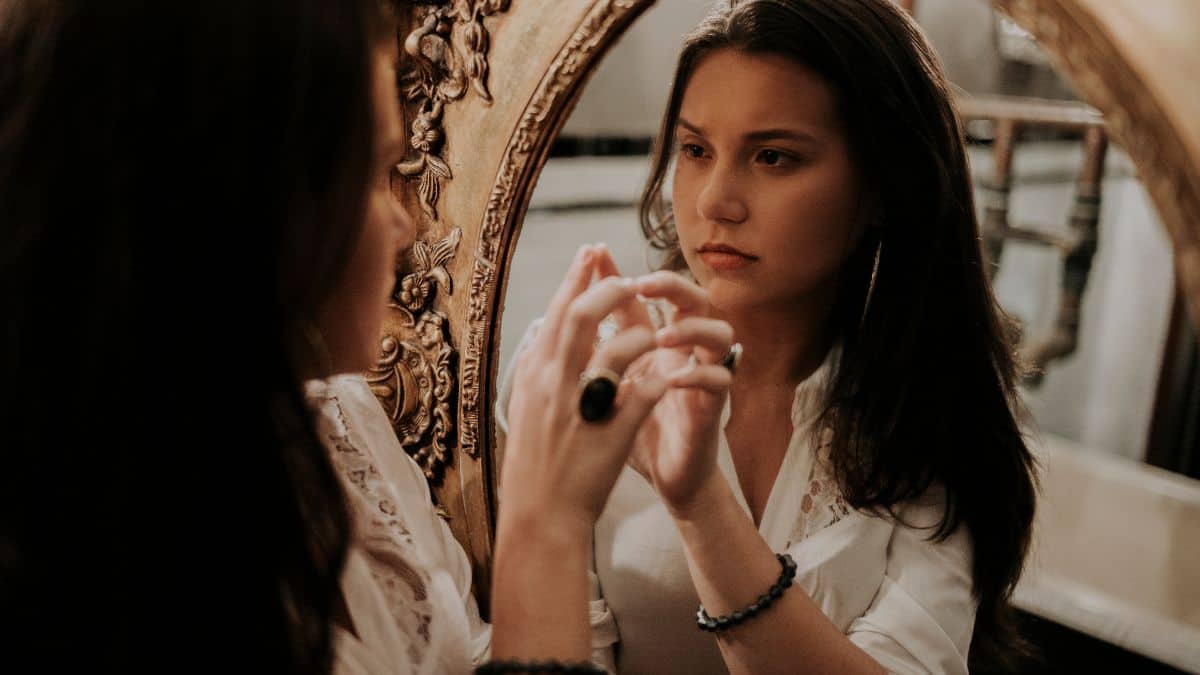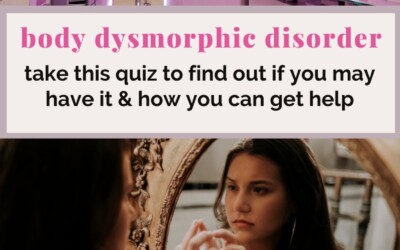If you’ve ever looked in the mirror and felt like you just don’t look right, even though others tell you that you look fine, you’re probably wondering who to trust: the voice in your head or your friends or family. You may be wondering…do I have Body Dysmorphic Disorder?
In this blog post, we will explore some common symptoms of BDD and provide a self-guided quiz to explore your own relationship with your body. You can use the quiz results to get curious about how your relationship with your body is impacting your life.
And if you’re new here: welcome! I’m Colleen, an Intuitive Eating dietitian whose mission is to free women from the trials and tribulations of diet culture. Your body is the least interesting thing about you and your size shouldn’t be dictating how much joy you get out of your daily life. I can help you to find freedom.

If you’ve been picking apart your appearance, weighed down with worry about how you look, and even avoiding social activities because of your body, you might be worried that you have body dysmorphia. In this blog post, we’ll discuss what this condition is and offer a few quiz questions that you can use to reflect on your own.
Note: this blog post is not intended to diagnose or treat any mental health condition, including Body Dysmorphic Disorder (BDD). Our intention here is to educate about this condition and encourage you to seek professional support if you are worried that you might be struggling with this condition.
First things first: what is Body Dysmorphia, exactly?
What is body dysmorphia?
Body dysmorphic disorder (BDD) is a mental health condition where a person spends a lot of time worrying about their appearance and how they look to others. BDD is related to Obsessive Compulsive Disorder (OCD).
Despite the fact that it is quite common, occurs across the world, and has a significant influence on a patient’s functioning, well-being, and risk of suicide, many people with BDD do not actually have a diagnosis.
People with BDD can perceive flaws in their appearance that are not actually there, or they might be excessively concerned about a very minor flaw. For example, someone with BDD might believe that their nose is very ugly, that their wrinkles or pimples ruin their face, or that their hair is thinning excessively.
And as we mentioned earlier, Body Dysmorphia is related to Obsessive Compulsive Disorder (OCD). People with OCD have intrusive, unwanted thoughts (obsessions) and do repetitive behaviors (compulsions) to try to control these thoughts. The two disorders are not mutually exclusive: some people with BDD might also have OCD.
BDD is far more severe than simply not loving your body shape or being annoyed about a pimple that sprouted overnight; body dysmorphia consumes hours of each day and may prevent the person from going to work or school or participating in social activities.
What is NOT body dysmorphia?
Body dysmorphia might have similarities with other conditions, but it is not the same as anorexia, depression, or anxiety. However, like OCD, it is also possible to have BDD and other conditions, including the ones listed here.
BDD is not just a poor self-image or having a bad hair day; it is far more severe.
BDD subtypes
Beyond more broadly feeling that your body is deeply flawed, there are two additional subtypes of BDD. These are:
- Muscle dysmorphia – believing that you’re too small or insufficiently muscular, even though they may be very large and muscular
- Skin picking disorder – focuses on skin blemishes like acne, moles, or wrinkles
Trichotillomania is a separate disorder where the person pulls out their own hair compulsively as a coping mechanism for stress and anxiety.
Interestingly, body dysmorphic disorder patients actually see faces differently. In the linked YouTube video, we meet with researchers who track eye movement patterns between people who do and who do not have BDD – the patterns are totally different!
Eye movement patterns are not the only sign of BDD – there are many more symptoms.
Signs of body dysmorphia?
What does it look like if someone has body dysmorphia? There are a few key things to look for:
- There is an overwhelming preoccupation with a physical flaw that others often cannot see
- The person engages in repetitive behaviors like skin picking, mirror checking, or excessive grooming…and they don’t feel better after the behavior
- They use excessive amounts of makeup or undergo unnecessary cosmetic procedures
- They might wear clothes that cover their body excessively
- They’ll likely avoid social settings, including work, school, and time with friends or family.
BDD has a significant negative impact on daily living.
What causes body dysmorphia?
The cause of BDD is not fully understood, but it’s thought to be linked to a combination of genetic and environmental factors. It often begins in adolescence or young adulthood, and women are more likely to experience it than men. Low self-esteem can contribute to the development of BDD.
How common is Body Dysmorphia?
BDD affects about 1 in 50 people. In the US, there are an estimated 5 to 10 million people with this disorder.
Diagnosis of BDD
A mental health professional will consider your symptoms and how much they affect your life in order to offer a diagnosis.
BDD can be difficult to diagnose. Some people with the disorder may not seek help because they’re embarrassed or ashamed. And, because BDD is often comorbid with other mental health conditions, such as anxiety and depression, it can be mistaken for those disorders.
For a diagnosis,
- You must be overly concerned about a minor or non-existent flaw
- Your anxiety about your body gets in the way of daily living
- Other mental health conditions have been ruled out
If you think you might have BDD, it’s important to see a mental health professional. You’re worth feeling better and living a life without feeling shame or guilt about your body.

Body Dysmorphia Quiz
Now that you know a bit more about what BDD is and what the symptoms are…you are probably ready for the quiz.
Do I Have Body Dysmorphia?
is your relationship with your body holding you back?
Take this 10 question quiz to find out!
Note: this quiz is not intended to diagnose or treat any medical condition, including BDD. The intention is to draw attention to common symptoms of this mental health condition. If you answer yes to more than a few of the included quiz questions, I strongly encourage you to seek support from a mental health professional.
Treatment of BDD
BDD is not something that will go away on its own. BDD is a chronic condition that may get worse without help. It can also get worse as the person ages and has more “flaws” to focus on, such as wrinkles.
There are a number of different treatments for BDD, including:
Cognitive behavioral therapy (CBT): This is the most effective treatment for BDD. CBT helps people with BDD change the way they think about their bodies and teaches them how to manage their compulsions. (Psst: CBT is an amazing treatment modality for lots of things, including our relationship with eating and dieting. In fact, I use CBT as part of the training in The SociEATy).
Exposure and response prevention (ERP): This is a type of behavioral therapy that gradually exposes people to situations designed to expose a person to their obsessions in a safe environment. (Again, something else I use with my clients in The SociEATy when they’re breaking their food rules and improving body image!)
Medication: While there is not a BDD-specific medication, people with BDD may be treated with anti-anxiety and/or antipsychotic medications as well as antidepressants.
Group therapy may be available in your area and another option for treatment, in addition to individual counseling sessions.
How to get help
The International OCD Foundation has a database of practitioners who can support you on your BDD recovery journey. Search the Resource Directory for BDD therapists, clinics & programs, treatment programs, support groups, and affiliates in your area.
Get curious about your own emotions with my Intuitive Eating Food & Mood Journal and my 40+ Gratitude Journal Prompts For Mind & Body.
The UK-based BDD foundation has a list of self-help books for BDD.
Key takeaways
BDD is a common condition, but it is treatable. You’re not alone if you feel like you have a degree of BDD. I’m proud of you for reading this post and wanting to learn more about it!
Most of us have days where we simply don’t love the way our body looks or feels; this is 100% normal. But BDD is having these feelings to a much greater degree. You’re worth having a life beyond worries about how you look. If you’d like to join a fabulous virtual support group to learn how to make peace with food and body, I’d love for you to check out The SociEATy and see if it’s a good fit. If so, you have an official invite to join our club!
XOXO
-Colleen






Leave a Reply